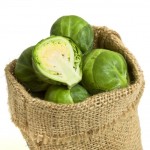Please Pass the Brussel Sprouts

Now while I’ve yet to visit Brussels, Belgium, this I know: THEIR SPROUTS ROCK!
But I didn’t always feel this way—trust me.
In the past, the sulfur-like, rotten egg smell of overcooked (usually boiled) Brussel sprouts would have me saying a quick, “No thanks” anytime I was offered them. But over the last decade I’ve taken quite a shine to this vegetable which resembles mini heads of cabbage.
What happened between then and now? I’ll tell you what: I learned new cooking methods to bring out their best characteristics (taste and nutrition) while avoiding their potentially worst characteristic—their off-putting smell.
Brussel sprouts are an extremely healthy choice when looking to complement a main course protein. They hail from the cruciferous vegetable family which makes them a close cousin to cabbage, collard greens, broccoli, and kale. As cousins, Brussel sprouts contain all the same wonderful anti-aging, cancer-preventive elements that their other family members do. Plus, Brussel sprouts are particularly high in vitamins K and C!
When purchased, good quality Brussels sprouts should be firm/compact, free from pin holes (aphid problem), and be vivid green in color. Give ‘em a quick rinse and then halve or quarter them (depending on their size) with a sharp knife and they will be ready to cook.
My favorite method of preparing Brussel sprouts is to roast them. Plain and simple, I toss them in some extra virgin olive oil, salt and pepper, spread them out on a baking sheet with some “elbow room” and bake them at 350°F for 30-45 minutes (for halved sprouts, less time for quartered). This method of cooking caramelizes and crisps the sprouts in a divine way. They should come out of the oven looking a bit “charred” on the edges.
Try them—you’ll think you died and went to Belgium!

